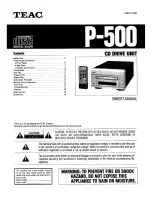
Appendix B: Glossary
Page 26
Kenwood 72X and 62X TrueX User’s Guide
Internal:
This refers to a device that is located physically within the
computer case. For example, a processor is an internal device.
Jumper Block:
A set or series of metal pins onto which jumper caps
are installed.
Jumper Cap:
A small removable plug used to determine some aspect
of hardware configuration by closing a circuit when installed.
Master:
On IDE connections, the setting for the device that will ‘host’
the connection. The Slave is its counterpart.
Motherboard:
The main board of a computer system. It typically has
connections for additional boards and contains the processor, memory, and EIDE
connections.
MSCDEX.EXE:
The Microsoft CD-ROM extensions program. Used to
activate CD-ROM drivers in MS-DOS and set up a drive letter. Usually this file
is loaded in the AUTOEXEC.BAT file. This file is required for Windows® 95
reinstallation.
Peripheral:
See device
Pin 1:
A label that helps one correctly align and connect cables to devices. Pin 1
should be connected to the pin 1 side of a ribbon cable (usually the side with the
red stripe).
Plug and Play:
Originally, a specification developed by Microsoft detailing how
devices should operate in a system. In this context, it refers to hardware that
can be plugged into a computer, automatically recognized on start up, and
immediately used. All configurations are done automatically for the user.
Red stripe:
Used to indicate Pin 1 on a ribbon cable.
Ribbon Cable:
see IDE Cable
Slave:
On IDE connections, the setting for the devices that is “hosted”
by the Master device.
Sound card:
A peripheral card or add-in board used to create sounds on a PC.
It is usually connected to a slot on a computer’s motherboard.
KW-40 72/62X atapi manual 12/13/99 3:25 PM Page 28





































